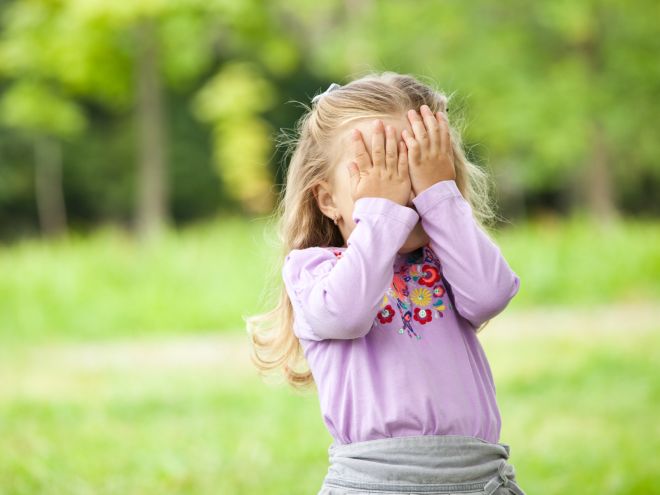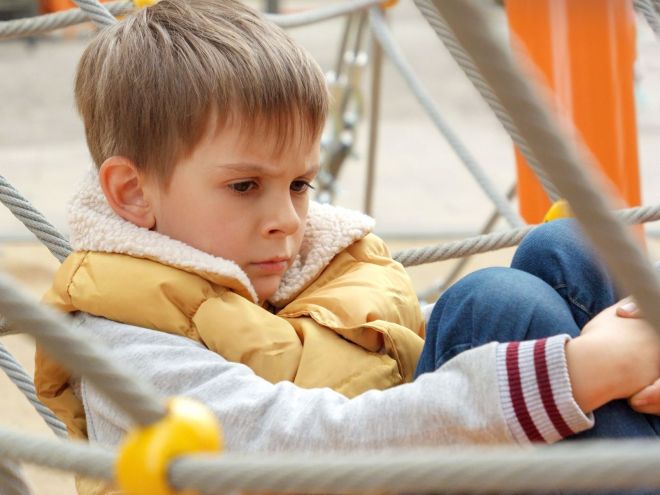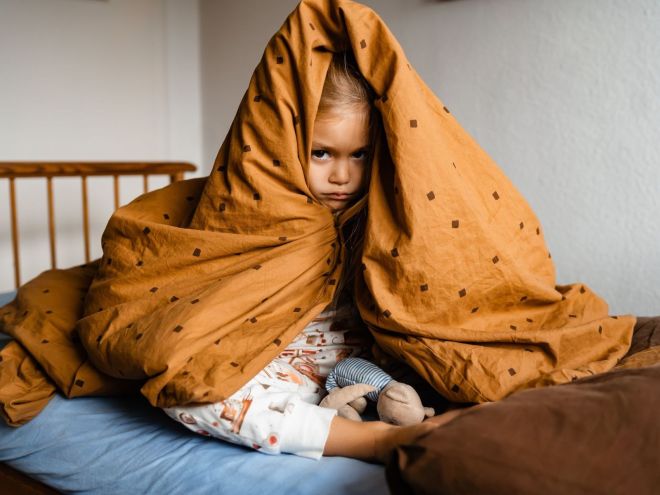Confidence killer for kids: Labels. Do you think your child doesn’t have any?



We want our kids to be brave, smart, and strong. Plenty of self-confidence, of course. So they’ll be successful in life. Did you know we might also be robbing them of that self-confidence every day?
Emma and I are sitting on the carpet looking at a Lion King book. “She’s always so bashful, you see. It takes her forever to feel comfortable in a new place,” the woman sitting nearby explains. That’s her mother, who worries that her little girl isn’t outgoing enough.
“She’d hide behind me all the time if she could. You’re Mommy’s little shy violet, aren’t you?” she says, turning to her daughter.
Emma doesn’t say a word. Instead, she turns a page in the book.
“My mother-in-law criticizes me that I’m spoiling her and she’s too attached to me. Whenever she comes over, it takes Emma a while to warm up to her and start talking. At first, she won’t even say hi. That hurts her grandmother’s feelings. I don’t know how to make her be more friendly since she’s so shy.”
Before we all sat down on the carpet, Emma spent about an hour sitting on her mom’s lap and watching as we drank our coffee. She didn’t want any juice, an apple, or a cookie. And when they first rang the doorbell, Emma stood stock-still in the doorway and clung to her mom like a burr. She didn’t say hi. She just stared at me with these big brown eyes.
She reminded me of a fawn at the deer park we visited last fall. It stood at a distance and just watched as the adult deer came over to be fed.
“Whenever we go anywhere, I can’t get a word out of her,” sighs her mom in frustration.
“Even at the doctor’s office. I have no idea how this child is going to handle kindergarten.”
“I’d like her to be more comfortable in public. I’m afraid the other kids will eat her alive.”
…
Let’s just pause this story right here (I’ve shared it with the kind permission of both Emma and her mom) and take a look at what sometimes lies behind children’s supposed shyness. I could see it in Emma’s fawn eyes.
It’s not about being bashful at all. It’s about the labels parents put on their kids.
It’s a topic as old as parenthood itself, yet how often do we overlook its vital importance? Truth be told, it deserves our keen attention. Those labels affect a fragile thing: our children’s self-confidence.
What children internalize when adults talk
Did you notice how many labels Emma’s mom used while talking about her?
She talked about her shortcomings in front of a stranger like it was nothing. She described just what her little girl was like. Of course, she didn’t want to hurt her feelings. She wanted to help her!
But Emma turned her fawn-like eyes to the ground and took in her mother’s assessments while we drank our coffee. And what did she internalize?
She’s a shy one, our girl.
Spoiled, too attached.
The other kids will eat her alive.
Ouch, Mom.
I guess I’d better stick even closer to you if the other kids might eat me alive.
You must not be very happy with me if that’s what I’m like …
Not the person you’d like me to be.
That’s what you said:
“I’d like her to be more comfortable in public.”
I don’t know what that means. But I guess it’s something you like.
Unlike me.
…
Would you want to change places with Emma?
Why do we do this to our kids?
Have you ever wondered why it’s completely normal to talk about kids right in front of them as if they aren’t even there? Would that have happened if Emma had been a coworker instead of a child?
“It’s not easy with our Emma here. You can hardly get a peep out of her. If she doesn’t like something, she won’t say anything, but just sulks around the office. She never speaks up in meetings and you can’t pin her down on anything. She’s such a wallflower. I don’t think she’s going to last long at this company. Isn’t that right, Emma?”
That would never happen, would it? Why not?
Because it’s rude? Harsh? Insensitive?
Then why do we talk like this about our kids without a second thought?
Slob. Clown. Klutz. Which one lives in your house?
You might be thinking that Emma’s mom was being pretty insensitive and that you would never have said something like that in front of your child. But listen to yourself next time you’re visiting friends or family and get to talking about your children. Or maybe when you’re chatting with a friend and holding your little one’s hand.
- Yeah, she was a total grump this morning. We almost didn’t make it to daycare in time.
- He drags his feet about everything.
- Whenever we go out he’s always showing off. Isn’t that right, monkey?
- I can’t get this kid to pick their toys up. Total slob.
- Oh, good grief, crying again. What’s the matter this time, hon?
- It’s not easy with this one.
- She’s not great at sports. Two left feet like her mom.
- Wow, your little one can draw pictures already? Not ours. He just scribbles. No budding Picasso over here.
- Oh, your baby can sit up already. Mine must be behind or something. He’s barely scooting around. Takes after me, I guess.
Has your child truly never heard anything like this from your lips? I’m not saying parents should weigh every single word they say around their kids. But it’s worth giving some thought.
Labels have a funny way of sticking to kids like glue
Sometimes these comments are just a way of making conversation. Often they’re delivered with a smile and a nudge – isn’t that right, you little monkey? We don’t mean anything bad by them.
Sometimes we’re just letting off steam. Maybe we want to find out how things are going for other families and if they have any advice to offer for our little slowpoke or mess-maker.
We don’t think of this as labeling our children at all.
But think about it again.
They’re trying to figure out who they are, but we’re telling them before they get the chance. They have two left feet. All thumbs. They’re a firecracker. A shy violet. A slob.
…
Well, Mom and Dad, how can you be so sure that I’m not just taking in what you say and acting it out? You’re the first person I listen to and trust, you know?
So I’m a klutz? I take after you?
Okay then.
Another Emma, another story. But not really.
“I never took any dance classes growing up. My parents always said I had two left feet. It drove them up the wall. I figured there was no point anyway, that I would never learn to dance. I’d just step on people’s toes,” another Emma told me once. This one is an adult. She turned 40 last year.
“Last year my husband and I said to heck with it, we’re signing up for ballroom dancing lessons. I joked around that they’d have their hands full with me. And they did. :) But you know, it turned out great. Even with my two left feet, I managed to learn the basics. I’m not such a hopeless case after all. This year we’re going to some ballroom dancing events.”
You might be thinking, okay, but what if Emma really was naturally uncoordinated? Whether her parents told her so or not? True, each of us has certain innate tendencies, things that come harder or more easily to us.
But would Emma not have had an easier time going to dance classes without that label of two left feet? Would she not have felt better with more self-confidence and without the conviction that she was sure to fail? Can someone with “two left feet” not enjoy dancing, even if they aren’t going to win any dance competitions?
Can’t a child love painting even if he doesn’t show much artistic talent and his artwork is going to win any awards? Do we have the right to tell him, “That’s not what a tree looks like!” and label his drawing a scribble? What if he grows up to be a happy and skilled house painter?
And who are you?
By the way, do you remember what kind of labels you wore as a child? Did you have two left feet too? Were you a slowpoke? An introvert? A shy violet? A slob? Some other category?
And what if we took those labels away?
What if the only reason we don’t dare to be who we are is because we simply don’t meet someone else’s expectations? Take Jane, for instance.
“My whole life I thought of myself as a terrible slob. I struggled with it for years to no avail. Eventually, I realized that I actually thrive in the chaos. I don’t feel the need to have things neatly stacked up, because it feels sterile and confined,” she explains.
Jane has a demanding creative career. She’s a fashion designer. She likes a chaotic environment and channels that energy into her collections. She’s even won a few awards for them, but she was never able to appreciate that affinity in herself. She saw herself as just a slob.
It’s not always easy shaking off a label we’ve begun to believe about ourselves.
What’s your experience with that?
Sometimes the labels we carry can result from a catastrophic error of judgment.
Tony was labeled “developmentally delayed” and almost got put in special ed. Today he’s a grown man with three children and was one of the few from his class to graduate from college. Once when he was in kindergarten, he was supposed to draw his mom. The picture was meant to show her whole body, of course, since according to the developmental charts for his age he should have been able to do that.
But he wasn’t in the mood that day. “I needed to keep playing,” he told us. So he quickly drew just a big head and glasses. That was what he saw each night when his mom leaned over his bed to kiss him goodnight.
And the formal assessment?
“Still drawing head and legs only. Like a 3-year-old child. Even though he’s in kindergarten now. Must be developmentally delayed.”
Bam. There’s a label for you.
Hats off to the kids who don’t let labels like this hold them back.
Now back to our shy Emma from earlier. What about her?
She didn’t show any reaction to everything her mother said about her. Who knows what effect the labels had? What was more than clear, however, was that they weren’t going to make anything better. Emma had been displaying this behavior for a long time, and her mom just couldn’t get her to change.
Her mom was always coaxing her:
“Oh, come on, you can’t just sit in the corner your whole life. Look at the other kids. They aren’t holding back, are they? Be brave!”
And pushing her forward:
“Say hi to the nice lady, there’s a good girl. Look, here are some toys for you to play with. We don’t have these at home. You don’t have to sit on my lap the whole time. Soon we’re going to go home and you’ll wish you had played with the toys. Go on now.”
She kept trying to figure out why nothing was working:
“I don’t know what to do with her. How can I help her develop a thicker skin? Is it just her personality or something?”
Good intentions on the parents’ part aren’t always enough
She meant well, of course, like most parents do. Our parents meant well too.
Regardless, without meaning to she was sending Emma a clear message:
You don’t meet my expectations.
I want you to be different. Bolder. Less reserved. Better.
The way you are now is not good
So change, little one.
When a child becomes a problem
And Emma?
She had become a problem her mother was trying to solve. A little girl with many faults. Ones she had heard about so often they may have become part of her. And to hear her mom tell it, her uncertainty was growing over time.
Does that seem blown out of proportion to you?
And yet when people around you are unhappy with you, it gets to you after a while, does it not?
When you keep hearing:
… wrong, wrong again, do it differently, you have to try, you have to change, it’s not easy with this one, come on now, don’t be like that …
Don’t you feel like crawling into a corner somewhere, self-esteem at an all-time low, and hiding where no one can see you? Or are you more likely to stick your tongue out and be even more like that?
Emma was the first type.
And so the label becomes truth
Before we finish our story and let you know what ended up helping Emma and her mom, let’s just point out one more insidious aspect of labels. And that is the bland ordinariness of it all and how it slowly, subtly drives a wedge between us and our children until we don’t even know who they are.
As soon as we decide that our child is messy, shy, clumsy, or (fill in the blank), we start seeing them as messy, shy, or clumsy. We accept the label as well.
We start thinking, “Oh, that’s just the way my kid is.”
Once we do that, we might never discover that they aren’t like that at all. When we start seeing them through a label, we stop seeing them as they really are. Labels distort the truth.
Dana wrote us a message about how this very thing happened with her and her son. It was a small thing, but she said it really opened her eyes.
My son’s school was planning a class sleepover. I didn’t sign my son up, because he’s a bit of a homebody and is pretty attached to me. He’s never been interested in sleeping somewhere else. But then I started second-guessing myself and asked him,
“Hey, babe, your class is having a sleepover tomorrow. The kids are going to sleep there with the teacher, but that probably isn’t something you want to do, is it?”
“I do want to, Mom! I’ve never tried that before.”
I was so certain he would say no, that this was not something for him. He really surprised me. I was convinced he would back out at the last minute, but he made it through the class sleepover with no problem. He enjoyed himself. And I realized that I have a tendency to see him a certain way and assume his reactions before he makes them. I think I know what he’s like, and I don’t always give him the chance to be different.
Did that kind of thing ever happen to you when you were young?
Everybody saw you as this or that, and never gave you the chance to be different?
But they never really knew you at all?
Maybe they never realized the kid they saw as the jokester was really sad and lonely inside?
Or that your shy exterior hid a rich inner world and dreams of becoming an actress?
Or that you can sing when no one’s listening?
Or that you never raised your hand in class, not because you didn’t care, but because you had lost your self-confidence and didn’t want to hear the teacher’s scoffing response of, “No, wrong again. Who knows the right answer?”
Now all of that is in the past. But it still kind of hurts, doesn’t it?
So why do we do the same to our own children?
If you want to truly know your child
This is pretty challenging, because we’re all used to focusing on labels, problems, and things to fix. But …
Try to avoid telling your children what’s wrong with them for a while.
Try to see what your children do as just something they do, not some kind of problem. They’re doing this right now, but that doesn’t mean that’s who they are.
Try not putting that label on them.
In other words, take a break from looking at what’s good and bad about them. Giving them some kind of report card or points out of 10 isn’t going to help, anyway.
Instead, start looking at what they need.
That’s what worked for Emma and her mom in the end. Today Emma is a confident 3rd grader who won 2nd prize in a math competition. Who would have predicted that when she was 4 and wouldn’t even say hi to her grandmother?
And what came next?
Solution: Remove the label. She isn’t shy. She just needs time
Emma’s mom and I talked for a while that day. Some time later she went through our Unparenting course. And then she did two things:
- She tried to take the label shy off of Emma. She stopped worrying that it would never change.
- Instead, she paid attention to what Emma actually needed when she started to act “shy.”
The next time they went somewhere, she said:
“I know you need to stay with me for a while. That’s all right. It takes me a while to feel comfortable in a new place too. When you’re ready, let me know and we’ll get out some toys for you to play with, okay?”
Do you see the change?
You’re okay, Emma.
You’re not some shy violet, you just need time.
Is it any wonder Emma felt less pressure? Her mom did, too, because now she had one less problem to deal with.
You’re not bad. You’re just you.
What would happen if we applied this same principle to all kids?
You’re not bad at art. You just draw differently. Do you need to experiment with paint?
You’re not a klutz. You just have your own tempo. Do you need more time than the other kids?
You’re not a drama queen. You’re just upset about something. Do you need me right now?
It’s different when you take away the labels, right?
Instead of problems to be solved, we have children who are just themselves. Maybe all they need is for us to see them that way. Plus a little time for them to bloom. Away from all the labels.
Every plant grows in its own time.
So make sure to give it to them.
What do you say?
Let them stay our children, not some persistent label.
P.S. This doesn’t mean you’re a horrible parent if you label your kids, if that’s what you were thinking. If this article touched a nerve, don’t let that become an excuse to label yourself. We wanted to offer some inspiration. If you found it helpful, put it into practice for your children’s benefit.


